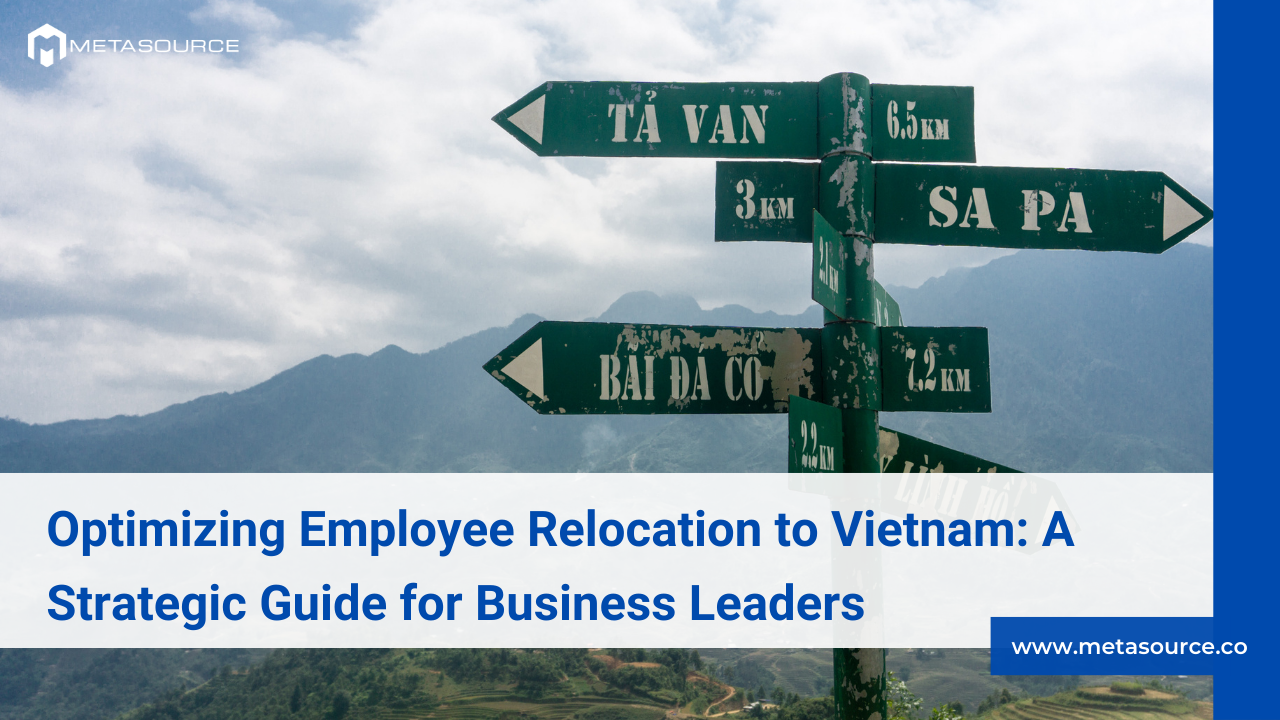Vietnam has become a top destination for businesses expanding into Southeast Asia, offering a skilled workforce, competitive operating costs, and a rapidly growing economy. As companies set up operations, relocating key employees is often necessary to establish leadership, oversee projects, or transfer specialized expertise. However, navigating Vietnam’s legal, tax, and employment landscape can be complex. Work permits, payroll compliance, and cultural adaptation present challenges that require careful planning. Business leaders must evaluate their options to ensure a smooth, compliant, and cost-effective relocation process. This article provides a strategic overview of what companies should consider when relocating employees to Vietnam and explores the most efficient solutions to simplify the process.
I. Key Considerations for Relocating Employees to Vietnam
1. Legal & Immigration Requirements
Vietnam enforces strict regulations on work permits and visas for foreign employees. Expatriates must obtain a valid work permit, typically granted for up to two years, and secure a business visa before starting work. Only legally registered companies in Vietnam can sponsor work permits, making relocation difficult for businesses without a local entity. The approval process can take 4–6 weeks and requires proof of the employee’s qualifications and experience. Non-compliance can result in visa denials, penalties, or deportation, disrupting business operations.
2. Employment & Tax Compliance
Foreign employees working in Vietnam are subject to personal income tax (PIT) rates from 5% to 35%, depending on residency status. Employers must also consider corporate tax implications, especially if relocating employees could establish a permanent establishment (PE) status, triggering additional tax liabilities. Social insurance contributions are another factor, as foreign employees are required to contribute 8% of their salary, while employers contribute 17.5%. Proper payroll structuring and compliance are essential to avoid unexpected tax and financial burdens.
3. Cultural & Workplace Adaptation
For relocated employees to integrate successfully, they must adapt to Vietnam’s business culture, which emphasizes hierarchy, indirect communication, and relationship-building. Language barriers can also be a challenge, as not all employees speak English fluently. Companies should implement cultural training, structured onboarding, and networking opportunities to ensure foreign employees feel supported in their new environment. A well-planned adaptation strategy enhances productivity and long-term retention.
4. Operational & Cost Factors
Beyond legal and compliance considerations, businesses must account for relocation expenses, housing, and cost of living adjustments. Expatriate housing in major cities like Ho Chi Minh City and Hanoi has become increasingly expensive, impacting budget planning. Additionally, internal HR teams may struggle to manage administrative requirements related to expatriate employment, leading to inefficiencies and compliance risks. Companies must evaluate whether direct employment, outsourcing, or alternative solutions provide the best balance of cost, compliance, and efficiency.
II. The Most Efficient Approach to Employee Relocation
Navigating Vietnam’s employment landscape without local expertise can be complex, time-consuming, and costly. One of the most effective solutions for businesses relocating employees is partnering with a specialized service provider that manages work permits, payroll, and legal compliance. This approach eliminates the need for companies to establish a local entity while ensuring that all employment regulations are met.
Outsourcing visa sponsorship, employment contracts, and payroll processing allows businesses to relocate employees more efficiently. It simplifies the administrative burden, accelerates market entry, and mitigates compliance risks. Companies can deploy employees within weeks instead of months, avoiding delays caused by entity registration and work permit complexities.
Cost efficiency is another major advantage. Establishing a legal entity requires significant investment, from office leases and business registration to maintaining a local HR and legal team. By leveraging an outsourced employment model, businesses eliminate these overhead costs while ensuring full compliance with Vietnam’s labor laws. Payroll processing, tax filings, and social security contributions are handled seamlessly, reducing the risk of penalties or payroll errors.
Beyond compliance, outsourcing employee relocation provides ongoing HR support, helping expatriates transition smoothly. This includes assistance with work permit renewals, tax advisory services, and cultural integration programs, ensuring that relocated employees remain focused and productive. Instead of navigating Vietnam’s complex regulatory landscape alone, companies can rely on experienced professionals to manage every aspect of employment and compliance.
III. Strategic Recommendations
Relocating employees to Vietnam requires careful planning and a deep understanding of legal, tax, and operational factors. From obtaining work permits to ensuring payroll compliance and cultural adaptation, businesses must take a strategic approach to minimize risks and optimize the relocation process. Instead of setting up a legal entity and handling complex administrative tasks internally, companies can benefit from outsourced employment solutions that provide faster, more cost-effective, and fully compliant relocation.
For business leaders considering employee relocation to Vietnam, evaluating the right employment model is key. Companies should assess their workforce needs, compliance risks, and long-term expansion plans to determine the most efficient approach. Engaging a specialized employment partner can ensure a seamless transition, allowing businesses to focus on growth while leaving legal and administrative complexities to experts. If your company is planning to relocate employees, now is the time to explore smart, compliant, and efficient solutions for long-term success in Vietnam.
Metasource: Your Workforce Management Partner in Southeast Asia
Metasource specializes in consulting and supporting businesses in managing global teams, with a focus on culturally diverse and dynamic markets. Operating in Vietnam, Thailand, Cambodia, and Indonesia, we provide seamless workforce solutions, ensuring compliance, efficiency, and strategic growth for companies expanding in Southeast Asia.
Read more: Navigating the Complexities of Obtaining a Working Permit in Vietnam
Read more: How To Register A Limited Liability Company In Vietnam A Quick Guide
Discover more tips to help boost your business further in Vietnam by following us on our website and Linkedln page


